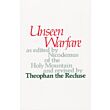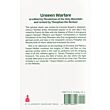Unseen Warfare: The Spiritual Combat & Path to Paradise of Lorenzo Scupoli edited by Nicodemus of the Holy Mountain & revised by Theophan the Recluse
translated by E. Kadloubovsky & G. E. H. Palmer
introduction by H. A. Hodges, M.A., D.Phil., Professor of Philosophy
introduction by H. A. Hodges, M.A., D.Phil., Professor of Philosophy
Publication Data: Crestwood, NY: St Vladimir’s Seminary Press, 1987
Format: softcover
Number of Pages: 280
Dimensions (l × w × h): 21.5 cm × 13.8 cm × 2.0 cm
ISBN-10: 0‒913836‒52‒4
ISBN-10: 978‒0‒913836‒52‒1
translated by E. Kadloubovsky & G. E. H. Palmer
introduction by H. A. Hodges, M.A., D.Phil., Professor of Philosophy
“The work which is here offered to the English reader has a striking history, and occupies a peculiar position in the world of Christian spiritual literature. In its original form it is the work of a Roman Catholic priest who lived and worked in Italy in the sixteenth century. The Combattimento spirituale of Lorenzo Scupoli was first published in 1589, and was afterwards enlarged by the author himself to many times its original size. [...]In the eighteenth century a copy of Scupoli’s work fell into the hands of a monk named Nicodemus, an inhabitant of the famous Orthodox monastic settlement on Mount Athos. Nicodemus was so impressed by it that he translated it into Greek, combining it with a shorter work also by Scupoli, and giving it the title of Unseen Warfare (Ἀόρατος Πόλεμος). In translating it he made various changes and adjustments to adapt it to the needs of Orthodox readers, and added copious notes and illustrations drawn from the Bible and the Fathers of the Eastern Church. [...]From there, in turn, it made its way to Russia in the nineteenth century. Bishop Theophan the Recluse, a director of souls and an ascetic theologian of note, who was acquainted with Nicodemus’ writings, was moved by his admiration of them to translate the Unseen Warfare from Greek into Russian. Like Nicodemus, and on an even greater scale, he allowed himself in translating it to make various changes and adaptations. The resulting version, supported by the double authority of Nicodemus and Theophan, took an assured place in the spiritual literature of the Russian Church. It is from Bishop Theophan’s Russian text that the present translation into English is made.”
—“INTRODUCTION”
CONTENTS
Introduction by Professor H. A. Hodges
Foreword to the Russian Version
Foreword by Staretz Nicodemus
PART ONE
I. What is Christian perfection?—Warfare is necessary to acquire it—Four things indispensable to success in this warfare
II. One should never believe in oneself or trust oneself in anything
III. On hope in God alone and on confidence in Him
IV. How to recognise whether a man acts without self-reliance and with perfect trust in God
V. On the wrong opinion of those who deem excessive grief a virtue
VI. Some indications on the scope and limits of disbelief in oneself and of complete trust in God
VII. On how we should exercise our mind, lest it be sick with the disease of ignorance
VIII. On reasons for our wrong judgment of things and how to form a right judgment of them
IX. On protecting the mind from too much useless knowledge and idle curiosity
X. How to train one’s will to have but one ultimate aim in all things, both external and internal—to please God
XI. Some reminders that can impel our will towards desire to please God in every activity
XII. On the many desires and tendencies existing in man and on their struggle with one another
XIII. On how to fight against the dumb sensory will, and on the training necessary for the will to acquire experience in virtues
XIV. What to do when the higher, intelligent will seems to be entirely overcome by the lower will and by the enemies
XV. War should be waged ceaselessly and courageously
XVI. How a warrior of Christ should prepare for battle in the morning
XVII. In what order should you fight your passions?
XVIII. How to fight sudden impulses of passions
XIX. How to struggle against bodily passions
XX. How to overcome negligence
XXI. On the control and right use of the outer senses
XXII. The same sensory objects we were speaking of can be means and instruments for a right control of our senses, if from them we pass to reflections on the incarnation of God the Word, and the mysteries of His life, passion and death
XXIII. How to translate sensory impressions into profitable lessons
XXIV. General lessons in the use of the senses
XXV. On control of the tongue
XXVI. How to correct imagination and memory
XXVII. A warrior of Christ should use all means to avoid worries and agitations of the heart, if he wishes to overcome his enemies
XXVIII. What to do when we are wounded in battle
XXIX. The order of battle pursued by the devil in spiritual warfare against us all and how he seduces people of different inner states
XXX. How does the devil confirm sinners in their slavery to sin?
XXXI. How the enemy keeps in his nets those who have realised their perilous position and wish to be free of it, but make no move. And the reason why our good intentions are so often not fulfilled
XXXII. On the wiles of the enemy against those who have entered the right path
XXXIII. How the enemy diverts a man from righteous deeds and spoils them
XXXIV. How the enemy turns the virtues themselves against those who practise them
XXXV. Some indications useful in the work of overcoming passions and acquiring virtue
XXXVI. On the order of acquiring virtues
XXXVII. What dispositions are needed to acquire virtues in general and how to undertake training for any one of them
XXXVIII. Virtue should be practised constantly and with all diligence
XXXIX. A man should not avoid opportunities he meets for good actions
XL. One should love those opportunities of practising virtue which are particularly difficult
XLI. How to progress in one and the same virtue in different circumstances
XLII. How long should one exercise oneself in each virtue and what are the signs of progress in it?
XLIII. One should not desire too strongly to be free from the attack of afflictions, but should wholly abandon oneself to God’s will
XLIV. Warning against evil counsels of the devil in relation to good actions
XLV. Our severe judgment of others comes from a high opinion of ourselves and the instigation of the devil. How to overcome this tendency
XLVI. On prayer
XLVII. What is mental or inner prayer, and of what kinds can it be?
XLVIII. How to learn to pray in this way
XLIX. On praying in one’s own words
L. On short prayers, or short prayerful sighings to God
LI. On the Jesus Prayer
LII. Aids to success in gaining the habit of prayer
LIII. The role of prayer in unseen warfare
PART TWO
I. The most holy sacrament of the Eucharist
II. How one should partake of the Holy Sacrament of the Eucharist, or partake of Christ our Lord sacramentally—in the sacraments
III. How to kindle the love of God in oneself by entering into the sacrament of the Eucharist
IV. Communion of the spirit
V. On giving thanks to God
VI. On surrender to the will of God
VII. On warmth of heart, and on cooling and dryness of heart
VIII. On guarding and examining conscience
IX. On preparation for battle with the enemies in the hour of death
X. The four temptations which come from the enemy in the hour of death. The first temptation, against faith, and the means to overcome it
XI. Second temptation in the hour of death—through despair
XII. Third temptation in the hour of death—by vainglory
XIII. Fourth temptation in the hour of death—by phantoms
XIV. On spiritual peace of heart
XV. On the means of preserving inner peace
XVI. Peace of heart is established little by little
XVII. To preserve peace of heart one must avoid honours and love humility and poverty
XVIII. It is essential that the soul remain secluded in itself for God to encompass it with His peace
XIX. On good sense in works of love for your neighbours, for the sake of your peace of soul
XX. Stripped of its will, the soul should surrender to God
XXI. Do not seek pleasures and comforts, but only God
XXII. Do not lose heart when inner peace withdraws or is interrupted
XXIII. Many are the wiles of the enemy to despoil us of inner peace; so watch
XXIV. One must not be perturbed by impoverishment of spiritual feelings or by other inner temptations
XXV. Every temptation is sent for our good
XXVI. Remedy against being perturbed by small transgressions and weaknesses
XXVII. If a man is perturbed, he must immediately reestablish peace in his soul
Format: softcover
Number of Pages: 280
Dimensions (l × w × h): 21.5 cm × 13.8 cm × 2.0 cm
ISBN-10: 0‒913836‒52‒4
ISBN-10: 978‒0‒913836‒52‒1
translated by E. Kadloubovsky & G. E. H. Palmer
introduction by H. A. Hodges, M.A., D.Phil., Professor of Philosophy
“The work which is here offered to the English reader has a striking history, and occupies a peculiar position in the world of Christian spiritual literature. In its original form it is the work of a Roman Catholic priest who lived and worked in Italy in the sixteenth century. The Combattimento spirituale of Lorenzo Scupoli was first published in 1589, and was afterwards enlarged by the author himself to many times its original size. [...]In the eighteenth century a copy of Scupoli’s work fell into the hands of a monk named Nicodemus, an inhabitant of the famous Orthodox monastic settlement on Mount Athos. Nicodemus was so impressed by it that he translated it into Greek, combining it with a shorter work also by Scupoli, and giving it the title of Unseen Warfare (Ἀόρατος Πόλεμος). In translating it he made various changes and adjustments to adapt it to the needs of Orthodox readers, and added copious notes and illustrations drawn from the Bible and the Fathers of the Eastern Church. [...]From there, in turn, it made its way to Russia in the nineteenth century. Bishop Theophan the Recluse, a director of souls and an ascetic theologian of note, who was acquainted with Nicodemus’ writings, was moved by his admiration of them to translate the Unseen Warfare from Greek into Russian. Like Nicodemus, and on an even greater scale, he allowed himself in translating it to make various changes and adaptations. The resulting version, supported by the double authority of Nicodemus and Theophan, took an assured place in the spiritual literature of the Russian Church. It is from Bishop Theophan’s Russian text that the present translation into English is made.”
—“INTRODUCTION”
CONTENTS
Introduction by Professor H. A. Hodges
Foreword to the Russian Version
Foreword by Staretz Nicodemus
PART ONE
I. What is Christian perfection?—Warfare is necessary to acquire it—Four things indispensable to success in this warfare
II. One should never believe in oneself or trust oneself in anything
III. On hope in God alone and on confidence in Him
IV. How to recognise whether a man acts without self-reliance and with perfect trust in God
V. On the wrong opinion of those who deem excessive grief a virtue
VI. Some indications on the scope and limits of disbelief in oneself and of complete trust in God
VII. On how we should exercise our mind, lest it be sick with the disease of ignorance
VIII. On reasons for our wrong judgment of things and how to form a right judgment of them
IX. On protecting the mind from too much useless knowledge and idle curiosity
X. How to train one’s will to have but one ultimate aim in all things, both external and internal—to please God
XI. Some reminders that can impel our will towards desire to please God in every activity
XII. On the many desires and tendencies existing in man and on their struggle with one another
XIII. On how to fight against the dumb sensory will, and on the training necessary for the will to acquire experience in virtues
XIV. What to do when the higher, intelligent will seems to be entirely overcome by the lower will and by the enemies
XV. War should be waged ceaselessly and courageously
XVI. How a warrior of Christ should prepare for battle in the morning
XVII. In what order should you fight your passions?
XVIII. How to fight sudden impulses of passions
XIX. How to struggle against bodily passions
XX. How to overcome negligence
XXI. On the control and right use of the outer senses
XXII. The same sensory objects we were speaking of can be means and instruments for a right control of our senses, if from them we pass to reflections on the incarnation of God the Word, and the mysteries of His life, passion and death
XXIII. How to translate sensory impressions into profitable lessons
XXIV. General lessons in the use of the senses
XXV. On control of the tongue
XXVI. How to correct imagination and memory
XXVII. A warrior of Christ should use all means to avoid worries and agitations of the heart, if he wishes to overcome his enemies
XXVIII. What to do when we are wounded in battle
XXIX. The order of battle pursued by the devil in spiritual warfare against us all and how he seduces people of different inner states
XXX. How does the devil confirm sinners in their slavery to sin?
XXXI. How the enemy keeps in his nets those who have realised their perilous position and wish to be free of it, but make no move. And the reason why our good intentions are so often not fulfilled
XXXII. On the wiles of the enemy against those who have entered the right path
XXXIII. How the enemy diverts a man from righteous deeds and spoils them
XXXIV. How the enemy turns the virtues themselves against those who practise them
XXXV. Some indications useful in the work of overcoming passions and acquiring virtue
XXXVI. On the order of acquiring virtues
XXXVII. What dispositions are needed to acquire virtues in general and how to undertake training for any one of them
XXXVIII. Virtue should be practised constantly and with all diligence
XXXIX. A man should not avoid opportunities he meets for good actions
XL. One should love those opportunities of practising virtue which are particularly difficult
XLI. How to progress in one and the same virtue in different circumstances
XLII. How long should one exercise oneself in each virtue and what are the signs of progress in it?
XLIII. One should not desire too strongly to be free from the attack of afflictions, but should wholly abandon oneself to God’s will
XLIV. Warning against evil counsels of the devil in relation to good actions
XLV. Our severe judgment of others comes from a high opinion of ourselves and the instigation of the devil. How to overcome this tendency
XLVI. On prayer
XLVII. What is mental or inner prayer, and of what kinds can it be?
XLVIII. How to learn to pray in this way
XLIX. On praying in one’s own words
L. On short prayers, or short prayerful sighings to God
LI. On the Jesus Prayer
LII. Aids to success in gaining the habit of prayer
LIII. The role of prayer in unseen warfare
PART TWO
I. The most holy sacrament of the Eucharist
II. How one should partake of the Holy Sacrament of the Eucharist, or partake of Christ our Lord sacramentally—in the sacraments
III. How to kindle the love of God in oneself by entering into the sacrament of the Eucharist
IV. Communion of the spirit
V. On giving thanks to God
VI. On surrender to the will of God
VII. On warmth of heart, and on cooling and dryness of heart
VIII. On guarding and examining conscience
IX. On preparation for battle with the enemies in the hour of death
X. The four temptations which come from the enemy in the hour of death. The first temptation, against faith, and the means to overcome it
XI. Second temptation in the hour of death—through despair
XII. Third temptation in the hour of death—by vainglory
XIII. Fourth temptation in the hour of death—by phantoms
XIV. On spiritual peace of heart
XV. On the means of preserving inner peace
XVI. Peace of heart is established little by little
XVII. To preserve peace of heart one must avoid honours and love humility and poverty
XVIII. It is essential that the soul remain secluded in itself for God to encompass it with His peace
XIX. On good sense in works of love for your neighbours, for the sake of your peace of soul
XX. Stripped of its will, the soul should surrender to God
XXI. Do not seek pleasures and comforts, but only God
XXII. Do not lose heart when inner peace withdraws or is interrupted
XXIII. Many are the wiles of the enemy to despoil us of inner peace; so watch
XXIV. One must not be perturbed by impoverishment of spiritual feelings or by other inner temptations
XXV. Every temptation is sent for our good
XXVI. Remedy against being perturbed by small transgressions and weaknesses
XXVII. If a man is perturbed, he must immediately reestablish peace in his soul
Write Your Own Review






